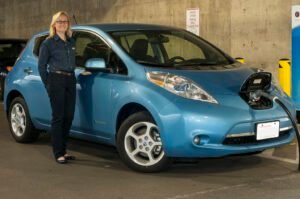The Best Used EVs: Your Guide to Smart, Sustainable Driving
Are you considering joining the electric revolution on a budget? The used EV market is exploding with exciting options. But with models, ranges, and prices to compare, finding the perfect fit can be overwhelming. This guide will reveal the best used EVs across different budgets and needs, so you can make an informed and eco-friendly purchase.
Why Buy a Used EV?
- Savings: Used EVs offer significant savings compared to brand new models.
- Depreciation: You avoid the steep initial depreciation that new cars experience.
- Eco-Friendliness: You get the environmental benefits of an EV without the manufacturing footprint.
- Expanding Market: More used EVs are hitting the market as early adopters upgrade.
Key Factors When Shopping for a Used EV
- Range: How far do you travel daily? Consider a range buffer (real-world range may be less than advertised).
- Battery Health: Ask for a battery health report or be prepared to assess it.
- Charging: Ensure it’s compatible with accessible charging stations (Level 2 or DC fast-charging).
- Age and Mileage: Older, high-mileage EVs may need a battery replacement sooner.
- Features: Do you have must-have tech or comforts? These evolve rapidly in the EV world.
Best Used EVs in 2024: Top Picks
Best Used EVs Under $30k
Nissan Leaf (2018+)
Alright, the Leaf ain’t the flashiest, but it’s your dependable mate for commuting and getting around town. Expect around 150 miles of range (even more with the Plus model). Roomy interior, comfy ride – it just gets the job done, no fuss.
- Range: 150 miles (240+ miles for the Plus model)
- Key Points:
- Spacious interior and comfortable ride
- Proven reliability and good value for money
- Perfect for daily commutes and errands
Chevrolet Bolt EV
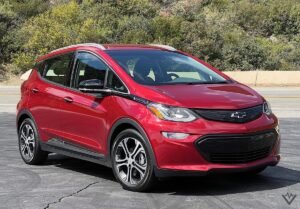
Here’s where it gets peppy! The Bolt gives you a whopping 250+ miles of range, perfect for longer trips. Super quick off the line too. Just make sure you’ve got any recalls sorted on older ones before buying.
- Range: 259 miles
- Key Points:
- Zippy acceleration and fun to drive
- Excellent range for longer road trips
- Recalls addressed on newer models
Hyundai Kona Electric
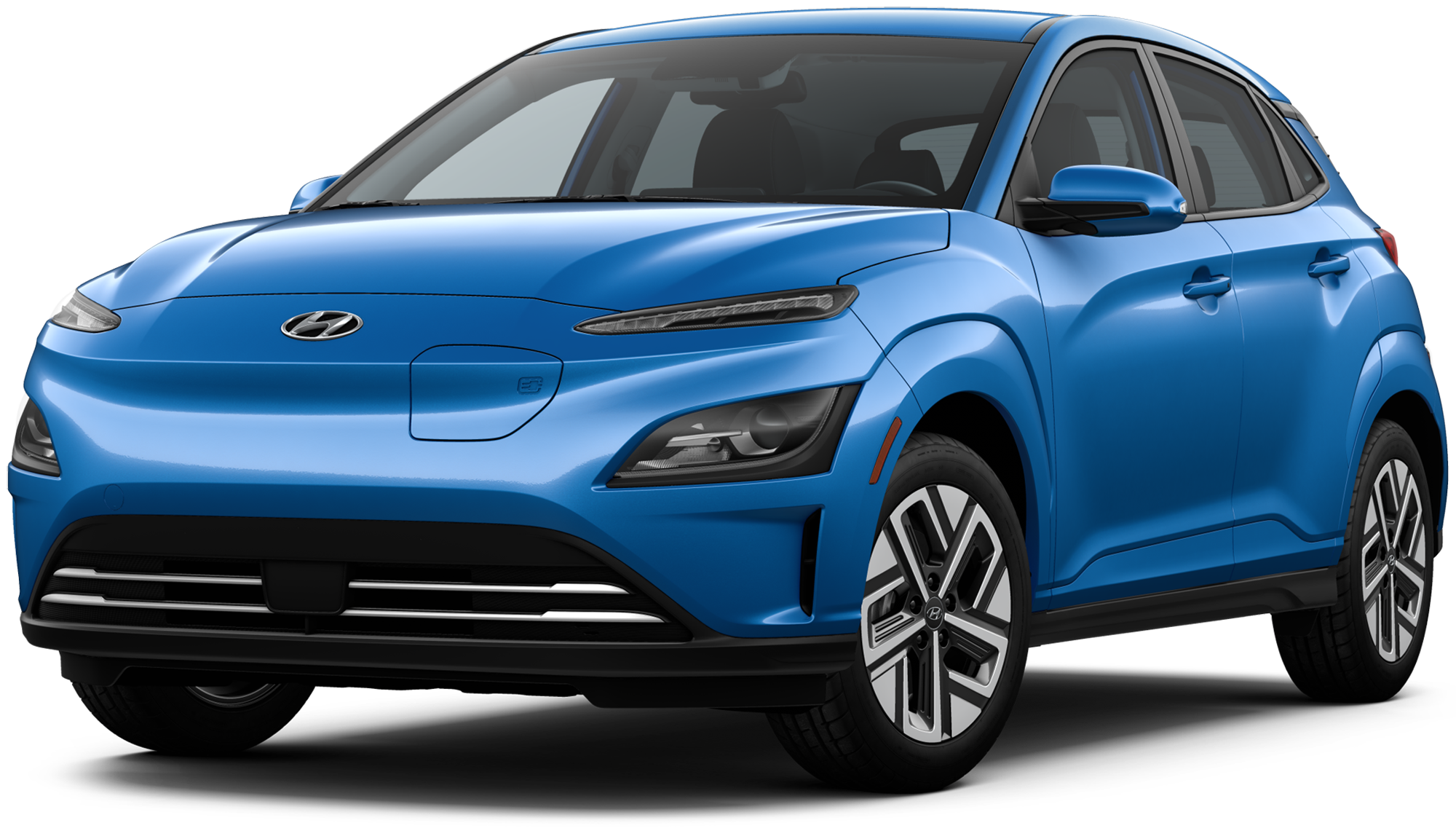
Fancy a bit of style? The Kona’s got that with its funky looks. Range-wise, it’s rock-solid at around 258 miles. Throw in a snazzy interior and all the tech you’d need, and this is a real contender.
- Range: 258 miles
- Key Points:
- Stylish design with modern looks
- Great range and well-equipped interior
- Offers a strong mix of practicality and fun
Best Used EVs Under $25k
Nissan Leaf (2016-2017)
Going a bit older with the Leaf? Good shout, these offer serious value. Range dips to around 100 miles, so mainly suited to city life. Keep an eye on battery health though.
- Range: 107 miles
- Key Points:
- Excellent affordability
- Better suited for urban driving due to shorter range
- Watch for battery health in older models
Kia Soul EV (2017+)
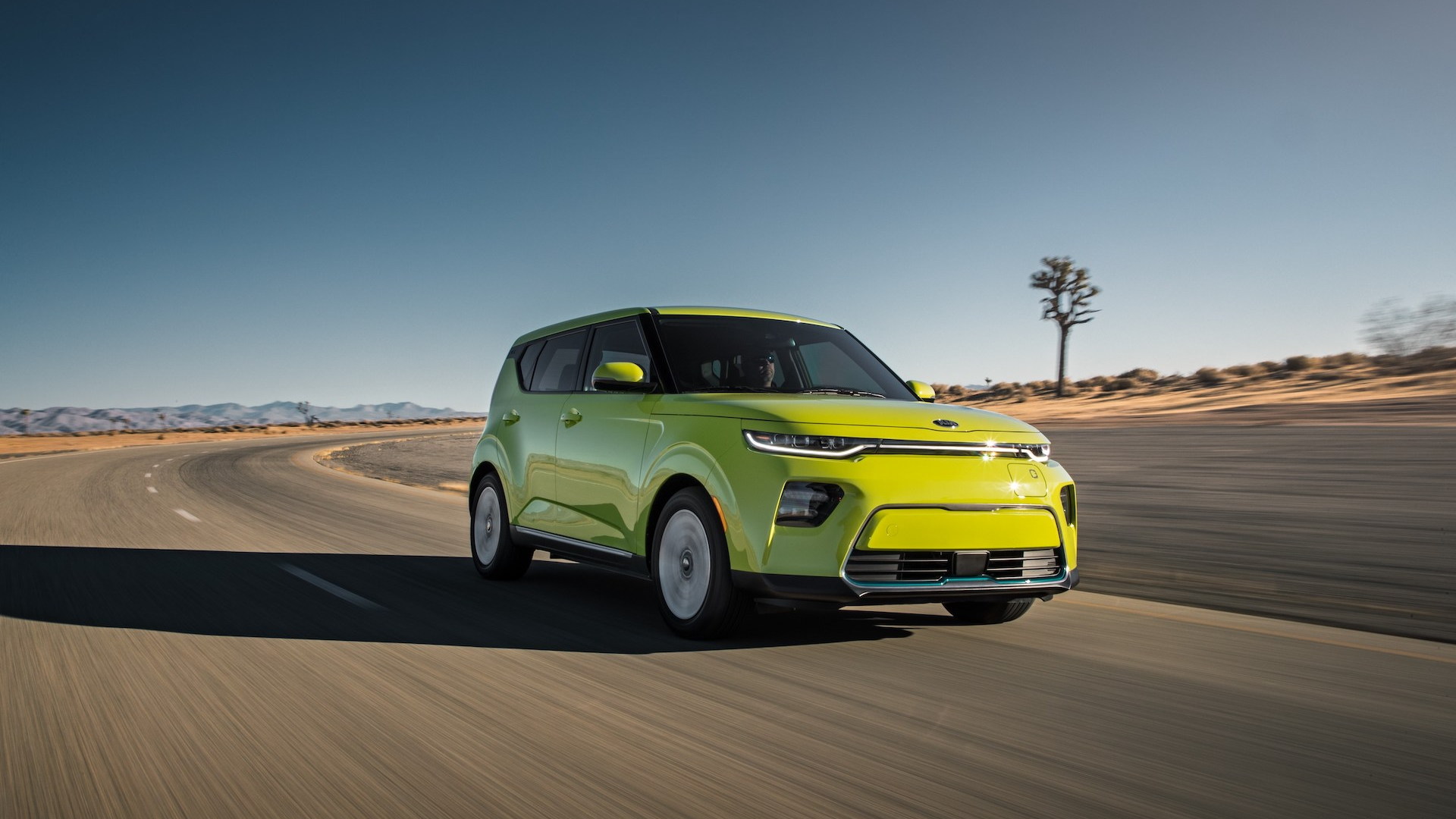
If practicality’s your thing, the Soul EV’s a boxy little winner. It’ll do over 100 miles no problem, has loads of space for hauling stuff, and that quirky design never gets old.
- Range: 111 miles
- Key Points:
- Practical, boxy shape offers ample cargo space
- Reliable and good value for the price
- Funky styling sets it apart
Best Used EVs Under $20k
Nissan Leaf (2013-2015)
Look, these early Leafs aren’t gonna cross any states on a single charge (about 75-80 miles realistic range). But for whizzing about town on the cheap? Unbeatable. Word of warning: older batteries might be a bit worn down.
- Range: 75-80 miles (real-world)
- Key Points:
- Lowest price point for EV entry
- Ideal for short commutes and city errands
- Check battery health carefully on older models
Fiat 500e
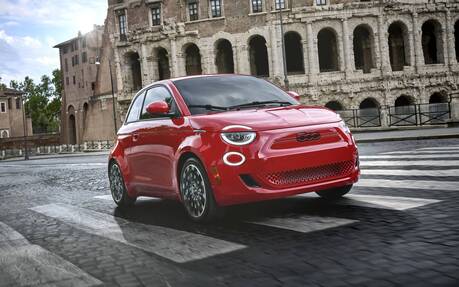
The little Italian job, only electric! Don’t expect massive range (around 80 miles), but if you’re mainly a city dweller, this thing’s a joy. Easy to park, zippy to drive, and dripping in retro charm.
- Range: 84 miles
- Key Points:
- Stylish and charismatic city car
- Perfect for tight urban environments
- Fun to drive and offers a unique character
Our Suggested Options to Consider
Volkswagen e-Golf: Fun and practical hatch
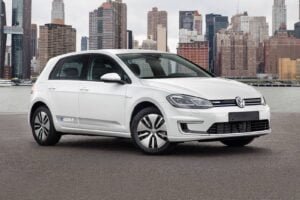
Pros:
- Feels Like a Familiar Golf: The e-Golf inherits the same comfortable, well-built interior, and similar driving dynamics as the standard Golf. You maintain the practicality of a hatchback with good space for its size.
- Refined Driving Experience: Electric motors provide instant, smooth acceleration making the e-Golf zippy and fun to drive in city environments. It’s a quiet and comfortable ride overall.
- Lower Running Costs: While this depends on electricity prices in your area, the generally lower maintenance needs and fuel costs (electricity vs. petrol) of electric cars make them cheaper to run long-term.
- Decent Starting Range (Older Models): Early e-Golf models have a real-world range of around 80-120 miles, which is sufficient for most daily commuting needs.
Cons:
- Limited Range (Compared to Modern EVs): Modern electric cars offer significantly higher range figures (200-300+ miles). Older e-Golfs might be restricting for road trips without careful pre-planning.
- Battery Degradation: As with all EVs, batteries degrade over time. Consider getting the battery health checked if you’re buying an older used e-Golf.
- Smaller Boot: Due to the batteries, the boot space is slightly smaller than a standard Golf.
- Increasingly Outdated Tech: Infotainment systems and driver assistance features may feel dated compared to newer cars.
Things to Check Before Buying:
- Software Updates: Ensure the car has the latest software, as early e-Golf models got range improvements through updates.
- Heat Pump: Ideally, look for models with a heat pump, especially if you live in a cold climate. This improves efficiency when using the heater in winter.
- DC Fast Charging: Some models have this option, which can make longer trips more feasible by offering a faster top-up at charging stations.
Should you consider a used Volkswagen e-Golf?
The used e-Golf makes a compelling choice if:
- You mainly need a car for local commutes and shorter journeys.
- You prioritize comfort, familiarity, and a well-built feel over the absolute latest tech.
- You can find a well-maintained one at a good price point.
Alternatives:
- Nissan Leaf (1st generation): Similar range to the early e-Golfs, may be even cheaper.
- Renault Zoe: Can offer slightly longer range than the e-Golf.
- Hyundai Ioniq Electric (older models): Another option with a comparable range to the e-Golf.
Where to Find Reviews:
- Fully Charged Show: They have several videos on the e-Golf. Search on their YouTube channel. (https://www.youtube.com/fullychargedshow)
- What Car?: https://www.whatcar.com/volkswagen/e-golf/hatchback/used-review/n17990
- Parkers: https://www.parkers.co.uk/volkswagen/e-golf/review/
Kia Niro EV: Spacious and well-equipped
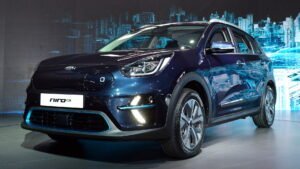
Pros
- Excellent Real-World Range: The larger 64kWh battery in most Niro EVs provides a realistic range of around 240-260 miles. This significantly reduces range anxiety and makes it suitable for longer journeys.
- Practical and Well-Equipped: The Niro EV offers the practicality of a small SUV/crossover. It has a decent-sized boot and good passenger space. You’ll find plenty of standard features like heated seats and a user-friendly infotainment system, even in older models.
- Strong Performance: The electric motor delivers instant torque for a nippy and enjoyable driving experience.
- Kia’s Long Warranty: Even used models should have some of Kia’s impressive 7-year warranty remaining, offering peace of mind.
Cons
- Slightly Higher Used Prices: Due to its excellent range and reputation, the Niro EV tends to hold its value well, meaning used prices might be a bit higher than some comparable EVs.
- Not as Exciting to Drive: The Niro EV prioritizes comfort over sporty handling. If you want a very engaging driving experience, it might not be the top pick.
- Charging Speed: While it supports DC fast charging, it’s not the absolute fastest charging EV on the market.
- Dated Interior (Older Models): Earlier Niro EVs have a slightly less modern-looking interior compared to some newer competitors.
Things to Consider
- Battery Size: The Niro EV was offered in smaller capacity battery options in some markets. Double-check you’re looking at the long-range 64kWh version.
- Condition and Battery Health: As with any used EV, pay close attention to the overall condition and get a battery health check if possible.
Is the Kia Niro EV a Good Used Buy?
Yes, the Kia Niro EV makes a fantastic used EV, especially if you prioritize:
- Long, usable range for the price
- Practicality and space
- Reliability and the reassurance of a remaining warranty
Alternatives
- Hyundai Kona Electric: Shares a similar platform and powertrain offering comparable range.
- MG ZS EV: Offers more space and a lower price point, though with slightly less range.
- Tesla Model 3 (Used): If your budget allows, a used Model 3 could be an option for even longer range and access to Tesla’s charging network but may be pricier.
Hyundai Ioniq Electric (2017-2019): Efficient and comfortable
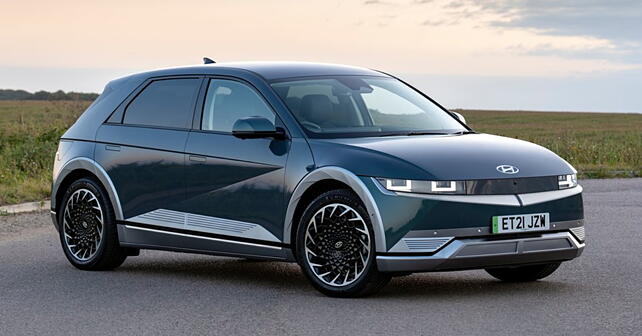
Pros:
- Efficiency: The Ioniq Electric was one of the most efficient EVs of its time, meaning lower running costs and a respectable range.
- Real-World Range (28kWh Model): Expect around 120-160 miles per charge, sufficient for most commutes and daily driving.
- Comfortable and Practical: Similar to other Ioniq models, the Electric variant offers a spacious, comfortable cabin and a versatile hatchback design.
- Good Equipment Levels: Even base models include features like heated seats, a touchscreen infotainment system, and adaptive cruise control.
- Remaining Warranty: Hyundai’s strong warranties might offer some coverage on used Ioniq Electrics.
Cons:
- Limited Range (Compared to Modern EVs): Newer electric cars offer much longer ranges (250+ miles), making the early Ioniq Electric less suitable for frequent road trips.
- Slow DC Fast-Charging: Even with this option, the charging speed isn’t the fastest by today’s standards.
- Conservative Styling: The Ioniq’s looks blend in, and some might find it less exciting than other EV designs.
- Battery Degradation: Batteries degrade with time and use. When buying used, having the battery health assessed is essential.
Things to Note:
- 28kWh vs. 38kWh: In 2019, Hyundai upgraded the Ioniq Electric with a larger 38.3kWh battery, increasing its range significantly (170+ miles).
- Driving Experience: The Ioniq Electric isn’t a sporty car, prioritizing comfortable, efficient driving.
Is a used Hyundai Ioniq Electric right for you?
The Ioniq Electric shines if you need:
- An efficient EV for predominantly urban and suburban driving.
- A comfortable and practical vehicle for commuting or running errands.
- Value for money in the used EV market.
Alternatives to Consider:
- Nissan Leaf (1st Gen): Similar range figures with potentially even lower prices.
- Renault Zoe: Can offer slightly more range than the smaller battery Ioniq Electric.
- Kia e-Niro (pre-2020): Provides greater range but might be a little more expensive.
BMW i3 (2014-2018): Unique design, city-dweller option (check if it has the range extender)

Pros
- Futuristic Design: The i3 stands out with its quirky exterior and a high-tech minimalist interior. It’s perfect if you want something truly different.
- Innovative Construction: Lightweight carbon fiber and aluminum provide agility and efficiency. This was cutting-edge tech when the i3 was introduced.
- Zippy Performance: Electric motors mean instant torque and swift acceleration, especially in city driving. The unusual tall and narrow design makes it surprisingly fun to maneuver.
- Good Everyday Range (for its era): Expect a real-world range of 70-100 miles, adequate for commutes and urban use.
- Range Extender Option (REX): If range anxiety is a concern, the REX models (discontinued in 2018) had a small gasoline engine to provide a backup.
Cons
- Limited Range (non-REX models): Modern EVs offer much longer ranges than the standard i3. Less suitable for regular long trips without careful planning.
- Unique Tires: The i3’s tall and narrow tires were specially designed, which can make replacements more expensive and harder to source.
- Firm Ride: The suspension can feel a bit firm, especially on rougher roads. Not the most comfortable cruiser.
- Controversial Styling: The i3’s looks aren’t for everyone. You’ll either love it or dislike its unusual proportions.
- Rear-Hinged “Coach” Doors: Accessing the rear seats is less convenient due to the door design.
Things to Check in a Used i3:
- Battery Health: This is especially important for older models, as range decreases over time.
- REX System (if present): Ensure it has been regularly maintained and functions correctly.
- Special “Worlds”: BMW offered different interior ‘Worlds’ (Lodge, Loft, Suite) each with unique materials and trims. Check if you like the particular combination in the used model you’re considering.
Who is the Used BMW i3 good for?
The i3 excels as a second car or a city vehicle if:
- You value quirky design and innovative tech: The i3 is like nothing else on the road.
- Range limitations aren’t a major concern: It suits urban driving far more than road trips.
- You want a fun and agile city car: The i3 is nimble and offers a surprisingly engaging driving experience.
Ford Focus Electric: Often overlooked, but capable

Pros
- Familiar Feel: The Focus Electric drives and handles much like a regular Ford Focus, offering a comfortable and predictable driving experience.
- Practicality: It retains the standard Focus’s hatchback practicality, with decent space for passengers and cargo.
- Value: Used Focus Electrics tend to be fairly affordable compared to other used EVs on the market.
- Decent Range (For Short Journeys): It offers a real-world range of around 75-100 miles, sufficient for everyday commutes and local errands.
Cons:
- Limited Range: The range can be restrictive for longer trips and highway driving, especially compared to more modern EVs.
- Slow Charging Speeds: Compared to the rapid charging options in newer EVs, the Focus Electric’s charging capabilities are slower.
- Outdated Infotainment: Features and systems can feel dated compared to newer cars.
- Battery Degradation: As with all EVs, batteries degrade over time, so expect a slightly reduced range in older used models.
Things to Consider Before Buying
- Your Intended Use: The Focus Electric is best suited to those primarily needing a car for city driving and shorter commutes.
- Battery State: Getting a battery health check before purchasing a used model is recommended.
- Software Updates: Ensure the car has the latest software updates, as these improved efficiency over time in early models.
Should You Buy a Used Ford Focus Electric?
If you meet these criteria, it can be a good choice:
- You need an affordable, no-frills EV for primarily local urban driving.
- You prioritize practicality and a familiar driving experience over the absolute latest tech.
- You’re comfortable with the limitations of the range.
Alternatives
- Nissan Leaf (1st Gen): Offers a similar range to the Focus Electric and can be found at comparable prices.
- Volkswagen e-Golf: Provides a slightly longer range and a bit more refinement.
- Renault Zoe: Another option with a slightly longer range than the Focus Electric.
Quick Note On Range: Remember, the way you drive and weather conditions seriously impact how many miles you’ll ACTUALLY squeeze out. Don’t get hung up on the big numbers, think about your daily needs realistically.
Important Notes:
- Market Fluctuation: Used EV prices change rapidly, so research current listings.
- Local Incentives: Factor in state or local incentives that can further reduce costs.
- Pre-Purchase Inspections: Always have a qualified mechanic inspect any used EV.
Where to Find the Best Used EVs
- Dedicated EV Dealerships
- Major Used Car Platforms: Carvana, CarMax (filter by electric)
- Manufacturer Certified Pre-Owned Programs
Ready to make the switch? The used EV market empowers you to drive electric without breaking the bank!
Here’s how to get a good idea of a used EV’s battery health:
Battery health report: Ask the seller if they have this available. Many EVs provide a built-in battery health assessment.
Range comparison: Compare the car’s current maximum range with its original EPA-estimated range. Significant loss in range might indicate battery degradation.
Pre-purchase inspection: Have a qualified EV mechanic thoroughly check the battery’s condition.
This depends entirely on your needs. Consider:
Daily commute length: Ensure the range safely exceeds your roundtrip commute.
Long trips: If you take frequent road trips, prioritize a used EV with longer range.
Charging availability: If you have easy access to public chargers, a shorter range might be less of a concern.
Yes, in most cases. EV batteries typically have a separate warranty (often 8 years/100,000 miles) which transfers to subsequent owners. However, it’s always best to check the specific manufacturer’s warranty terms for the model you’re interested in.
Model and year: Newer models with higher original prices will retain more value.
Mileage: Lower mileage cars tend to be more expensive
Battery condition: A healthy battery will command a premium.
Features and options: Premium trims and added features increase the price.
Market demand: Popular models may have higher prices due to demand
Use pricing tools like Kelley Blue Book or Edmunds, specifically for used EVs, to get a better idea of fair prices.
Yes, potentially!
Federal tax credit: Currently, there is a used EV tax credit in the US, with restrictions
State and local incentives: Some states and municipalities have additional incentives for used EV purchases. Search for incentives in your area.
Home charging is almost always cheaper. The actual cost depends on:
Your electricity rate: Cost of electricity varies by location.
EV’s efficiency: Measured in miles per kWh.
Public charging network: Different networks have varying pricing structures.
Here are the best places to look:
Specialized EV websites: Cars.com, Autotrader, etc., have filters for used EVs.
Dealership websites: Many large dealerships have a used EV selection.
Manufacturer pre-owned programs: Some automakers offer certified pre-owned EVs.
Private sellers: Marketplaces like Craigslist or Facebook might have listings, but proceed with caution.
In general, yes! Electric powertrains have fewer moving parts than traditional gasoline engines, leading to potentially less maintenance and lower risk of breakdowns. However, like any used car, do your research on the specific model’s reliability history.
Possibly. Here’s what you need to know:
Level 1 charging: Can use a standard 120V outlet, very slow charging.
Level 2 charging: Requires a 240V outlet and dedicated charger, much faster charging. Most EV owners opt for this.
